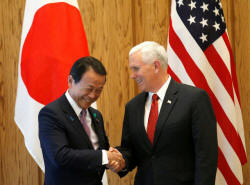|
Pence kicks off Japan
talks, both sides seek 'near term' results
 Send a link to a friend
Send a link to a friend
 [April 18, 2017]
By Roberta Rampton and Minami Funakoshi [April 18, 2017]
By Roberta Rampton and Minami Funakoshi
TOKYO
(Reuters) - U.S. Vice President Mike Pence on Tuesday put Japan on
notice that Washington wants results "in the near future" from talks it
hopes will open markets to U.S. goods, adding that the dialogue could
lead to negotiations on a two-way trade deal.
U.S. President Donald Trump and Prime Minister Shinzo Abe arranged the
economic dialogue between their deputies at a Washington summit in
February, soon after Trump took office.
"Today we are beginning a process of economic dialogue, the end of which
may result in bilateral trade negotiations in the future," Pence told a
news conference with Deputy Prime Minister Taro Aso, his counterpart at
Tuesday's talks.
"At some point in the future, there may be a decision made between our
nations to take what we have learned in this dialogue and commence
formal negotiations for a free trade agreement," he said. "But I leave
that for the future."
The comments dash the hopes of Japanese policymakers, who have said they
want to avoid use of the economic dialogue as a forum to discuss a
bilateral FTA that may put them under U.S. pressure to open up
highly-protected areas like agriculture.
They also echo those of U.S. Commerce Secretary Wilbur Ross, who told
reporters that Washington was eager to increase trade ties with Tokyo
through a two-way pact.
Trump campaigned for office on an "America First" platform, saying he
would boost U.S. manufacturing jobs and shrink the country's trade
deficit with countries like Japan.

Trump also abandoned the 12-nation Trans-Pacific Partnership (TPP)
backed by predecessor Barack Obama and Abe, and vowed to revisit
regional trade deals to focus on two-way agreements.
Pence said the TPP was a "thing of the past" and Washington would not
wait forever for results from the talks.
"When President Trump agreed to this dialogue, he envisioned this as a
mechanism for enhancing bilateral commercial relations between the
United States and Japan, and achieving results in the near future. And I
share that vision and impatience," Pence told Aso at the start of the
talks.
COOPERATION NOT FRICTION
Aso in turn said U.S.-Japan trade friction, which soured ties in the
1980s and 1990s, was in the distant past and the allies were now
entering an era of cooperation.
"In the past, U.S.-Japan economic relations have started from friction,
but we're entering a new area where we start from cooperation," he told
the news conference. "Instead of one side telling the other what to do,
I want to start debate on a relationship that is mutual and strategic."
[to top of second column] |

U.S. Vice President Mike Pence (R) is welcomed by Japan's Deputy
Prime Minister Taro Aso at the prime minister Shinzo Abe's official
residence in Tokyo, Japan April 18, 2017. REUTERS/Kim Kyung-Hoon

In a statement after the talks, the two sides said they had agreed the
dialogue should produce "concrete results in the near term." They agreed
to hold a second round of talks before the end of the year.
Ross, seen as more hardline on trade, was also visiting Tokyo and met
Japan's trade minister Hiroshige Seko, a sign a bilateral trade deal was
among Washington's top priorities.
"It's a little bit early to say just what forms things will take, but we
are certainly eager to increase our trade relationships with Japan, and
to do so in the form of an agreement," Ross said when asked about a
possible free trade pact.
Pence arrived in Tokyo from South Korea, where he visited the heavily
fortified border separating the North and South. He described the
U.S.-Japan alliance as the "cornerstone" of regional security.
Pence's 10-day tour of Asia aims at emphasising that U.S. President
Donald Trump wants to boost U.S. trade in the region, despite scrapping
the TPP.
NO CURRENCY TALK
Japan had a $69-billion trade surplus with the United States last year,
the U.S. Treasury Department has said, expressing concern over what it
called the "persistence" of the imbalance.
Japanese officials counter that Tokyo accounts for a much smaller chunk
of America's deficit than in the past, while China's imbalance is much
bigger.
Trump has complained Japan keeps its currency artificially low, although
a Treasury Department report last week did not label Japan a currency
manipulator.

However, currencies did not figure in Tuesday's talks, a Japanese
government official said.
(Writing by Linda Sieg; Additional reporting by Kiyoshi Takenaka, Leika
Kihara, Stanley White and Tetsushi Kajimoto in TOKYO, Hyunjoo Jin in
SEOUL and David Lawder in WASHINGTON; Editing by Paul Tait and Clarence
Fernandez)
[© 2017 Thomson Reuters. All rights
reserved.] Copyright 2017 Reuters. All rights reserved. This material may not be published,
broadcast, rewritten or redistributed. |